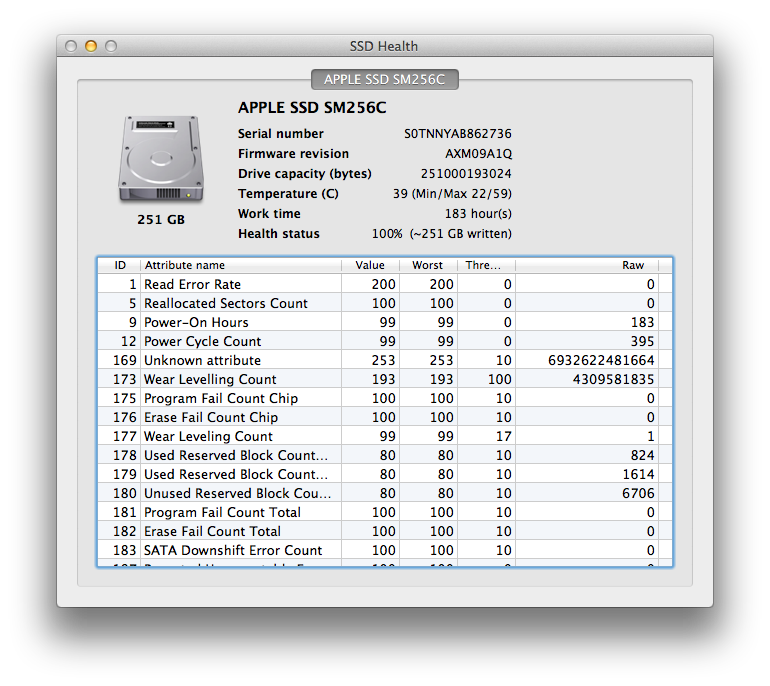
- #Check mac ssd health for mac
- #Check mac ssd health pro
- #Check mac ssd health software
- #Check mac ssd health code
Macintoshes, but also used for optimizing performance on a single machine.It is useful not only for comparing the relative speeds of two different.It provides a comprehensive benchmarking solution.It has an inbuilt benchmark feature that will measure SSD or hard drive speeds with the Benchmark feature.It reports about both Hard and Solid State Drives.It can monitor your disks and provide S.M.A.R.T to monitor relevant statistics and reports.It not only increases the data writing speeds but also increases the lifetime of SSD.It will bring trim to any Solid State Drive.
#Check mac ssd health for mac
SEE ALSO: 10 Best Windows Emulator for Mac


#Check mac ssd health software
However, if there are still some disk errors and no bad blocks, 3rd party repair software can be used (such as DiskWarrior, it can repair corrupted directories/files and diagnose the hard drive using S.M.A.R.T. If errors were repaired successfully, and there are no bad blocks, it can give some confidence the SSD Health is still good. Here are sample commands to repair the encrypted volume (as a root user): diskutil coreStorage list # Note the UUID.ĭiskutil coreStorage unlockVolume 11111111-2222-3333-4444-555555555555ĭiskutil umount /dev/disk22 # Unmount after it was mounted with write access.įsck_hfs -y /dev/disk22 # Check and repair any errors.įsck_hfs -S /dev/disk22 # Scan entire disk for the bad blocks. To avoid having disk being mounted, the best is to boot the system from either a single mode or macOS installer (USB or DVD) and run Terminal app. This will scan entire disk for, and tell whether it is corrupted, or the software repair should be enough.

The Apple's fsck_hfs tool has the -S option to scan disk for bad blocks.įor example: diskutil list # Note the disk path. Smartctl -t long /dev/sd # a few hours to wait For example, boot into Linux live USB/CD and run md5sum /dev/sd twice - the results must match for a healthy disk.įinally, if the above tests pass, while you're still booted into Linux, run short and then long test provided by smartctl: smartctl -t short /dev/sd # results can be seen after a few minutes You'll need to boot from another bootable medium from which you could calculate the hash of the whole SSD. If that test passes, you can proceed doing the same for the whole disk. You can test this on any large file to start with, the bigger the better. md5 path/to/file yields different hashes) in any two attempts it is sufficient indication that the SSD is terminally ill (of course provided that the file is not modified). I would not expect an SSD to live 10 years unless you keep it on the shelf. " Copied files are filled with NULLs, SHA256 mismatches" are indeed indicators of possible SSD failure.

Gzip: glibmm-2.54.1.: unexpected end of file Here are few reproducible data loss examples: $ wget -q Does it suggest my SSD is dead and it needs to replaced (if so, based on what information exactly)? On the other hand, shouldn't SSD drives work for at least 10 years?
#Check mac ssd health code
I've experienced recently some data loss (like copied files are filled with NULLs, SHA256 mismatches while installing packages, etc.), and First Aid found HD corrupt (exit code 8). Normally Health status should show the percentage, but it's showing >4252GB data written.
#Check mac ssd health pro
I've installed SSD Health (512GB) on my MacBook Pro (late 2013) which shows the following stats:


 0 kommentar(er)
0 kommentar(er)
